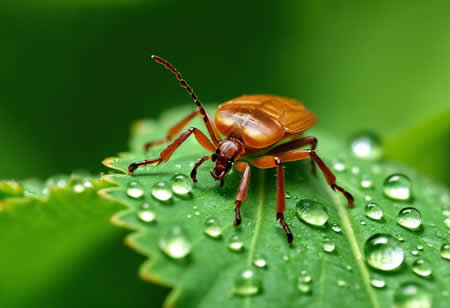
New Jersey, with its diverse forests and suburban landscapes, has long contended with ticks as a public health concern. However, climate change is transforming this challenge, leading to longer seasons of tick activity and the spread of tick-borne illnesses such as Lyme disease. Understanding how shifting weather patterns influence tick populations is critical for effective prevention and protection.
One of the most significant effects of climate change is the increase in average temperatures. Warmer winters mean that fewer ticks die off during the colder months, allowing more of them to survive and reproduce. Additionally, ticks now emerge earlier in the spring and remain active later into the fall. This extended activity period increases the risk of human and pet exposure, making tick control a year-round consideration for New Jersey residents.
Ticks thrive in moist environments, and rising humidity levels in New Jersey are creating optimal conditions for their survival. Wet summers and increased rainfall create the ideal habitat for ticks to thrive in both wooded areas and residential yards. These changes are particularly concerning for areas previously considered low-risk, as ticks are now moving into regions where homeowners and pets had little need for protection before.
Climate change also facilitates the migration of tick species into new areas. For example, the Lone Star tick, historically found in the southern United States, is now appearing in parts of New Jersey. These new species can carry diseases unfamiliar to local healthcare providers and residents, complicating treatment and prevention efforts. Awareness of these shifting patterns is essential for proper tick control strategies.
With rising temperatures and expanding habitats, tick-borne diseases are also on the rise. Lyme disease, anaplasmosis, and babesiosis are becoming more prevalent, and the extended active season for ticks increases the chances of transmission. Protecting yourself, your family, and your pets requires vigilance, from regular yard maintenance to professional tick control interventions.
Residents can take several proactive measures to minimize the risk of tick encounters:
Engaging with experts ensures the most effective, targeted approach, particularly as climate conditions continue to evolve. Outstanding New Jersey tick control specialists can assess properties, apply safe treatments, and provide guidance on long-term prevention strategies.
Climate change is reshaping the tick landscape in New Jersey, creating new challenges for residents and increasing the importance of prevention. By staying informed and implementing both personal and professional tick control measures, families can enjoy the outdoors with greater peace of mind.
Protect your home and family with expert New Jersey tick control from Bug Bombers today.
If you live in Williamstown, NJ, you know ticks can turn a great backyard into a worry zone. Our mild winters and wooded edges mean activity starts early and can linger deep into fall. The sure way to cut risk is scheduling professional tick control that […]
New Jersey, with its diverse forests and suburban landscapes, has long contended with ticks as a public health concern. However, climate change is transforming this challenge, leading to longer seasons of tick activity and the spread of tick-borne illnesses such as Lyme disease. Understanding how shifting […]